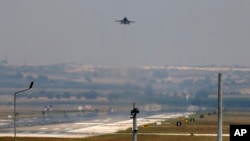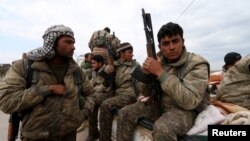Turkey claimed Thursday to have killed dozens Syrian Kurdish YPG fighters in airstrikes. The YPG is backed by the United States, but viewed as a terrorist group by Ankara. The news of the attacks comes ahead of a planned visit to Ankara by U.S. Defense Secretary Ash Carter.
The Turkish military says its air force launched 26 strikes on 18 targets, killing as many as 200 Syrian Kurdish YPG fighters. If confirmed, it would be the deadliest attack on the YPG by Turkish forces, although the militia claims only 10 of its fighters were killed.
The United States sees the YPG as a key ally in the war against Islamic State terrorism.
Ankara accuses the Syrian Kurds of being a terrorist organization linked to the Turkish Kurd PKK, which is fighting the Turkish state.
Turkish political columnist Semih Idiz of the Al Monitor website says the airstrikes carry a powerful message.
“I think it is a message, which indicates Turkey will do what it will do regardless of what others feel, and that may include America. They (Washington) will not be too happy about seeing one of their prime allies on the ground being bombed in this way by Turkey. So it will create waves, I personally think, and perhaps that is what is meant to do,” Idiz said.
Defense Secretary Carter is due in Ankara for talks Friday. He is scheduled to meet with Turkish President Recep Tayyip Erdogan to discuss Syria and the ongoing offensive to recapture Mosul from Islamic State.
Erdogan on offensive
On Wednesday, Erdogan underlined a new, more robust foreign policy. He said from now on, Turkey will not wait for problems to come knocking, will not wait "until the blade is against our bone and skin, will not wait for terrorist organizations to attack."
Erdogan warned Turkish forces that entered Syria in August to target Islamic State will increasingly target the YPG. Turkey accuses the YPG of seeking to create an independent state, which it fears would stir secessionist demands from its own restive Kurdish minority.
Thursday’s airstrikes are believed to be an attempt to stop YPG advances to capture the Islamic State-held town of al-Bab, which Turkish forces are also targeting.
During his Ankara visit, Carter is expected to seek to avoid a full-scale confrontation between Turkish and Syrian Kurdish forces.
But columnist Idiz says Erdogan’s likely priority is to secure U.S. support to overcome Baghdad's objections to Turkish forces participation in the battle to recapture the city of Mosul from IS.
“Turks will be looking to him to make some kind of statement about Turkish participation in this operation, and how it will be very vital, and how it will be very important. But Pentagon officials are saying no such agreement has been reached yet.”
Idiz warns while Turkey is a NATO member, relations with Washington are at one of their lowest ebbs. But observers say Carter is aware Turkey, with its large military airbases, remains a key ally in the war on Islamic State.











